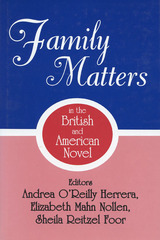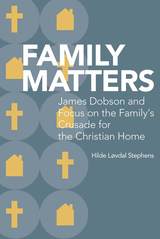

James Dobson—child psychologist, author, radio personality, and founder of the Christian conservative organization Focus on the Family—published his first book, Dare to Discipline, in 1970 and quickly became the go-to family expert for evangelical parents across the United States as American evangelicalism rose as a major political force. The family expert became a leading voice in the Reagan Revolution, and played a role in making American evangelicals even more firmly associated with the Republican Party. Dobson’s principle beliefs are that the family is the center of Christian America and that the traditional family must be defended from perceived threats such as gay rights, feminism, abortion, and the secularization of public schools. Dobson and Focus on the Family dominated Christian media through print, radio, and online venues, and their message reached millions of American evangelical households, shaping the cultural sensibilities and political attitudes of evangelical families throughout the culture wars from the 1980s into the 2000s.
Family Matters: James Dobson and Focus on the Family’s Crusade for the Christian Home by Hilde Løvdal Stephens is an insightful history and analysis of James Dobson’s rise to fame, effect on American evangelical culture, and subsequent descent from relevance. Extensively researched, Løvdal Stephens scoured through Dobson’s books, articles, and other materials published by Focus on the Family in order to explore how evangelicals defined and defended the traditional family as an ideal and as a symbol in an ever-changing world.
By contextualizing the history of Dobson’s reign, Løvdal Stephens’s discerning analysis fills an important gap in our understandings of the politics and culture of late twentieth-century conservative Christianity in the United States. She explores complex topics ranging from Dobson’s celebration of what he believes are timeless biblical values, such as maintaining strict and defined gender roles, to the ways Dobson and Focus on the Family balanced their basic ideals with real everyday lives of average American evangelical families, facing the realities of divorce, working mothers, and other perceived threats to the traditional family.

Adoption is a hot topic--played out in the news and on TV talk shows, in advice columns and tell-all tales--but for the 25 million Americans who are members of the adoption triad of adoptees, adoptive parents, and birth parents, the true story of adoption has not been told until now. Family Matters cuts through the sealed records, changing policies, and conflicting agendas that have obscured the history of adoption in America and reveals how the practice and attitudes about it have evolved from colonial days to the present.
Amid recent controversies over sealed adoption records and open adoption, it is ever more apparent that secrecy and disclosure are the defining issues in American adoptions--and these are also the central concerns of E. Wayne Carp's book. Mining a vast range of sources (including for the first time confidential case records of a twentieth-century adoption agency), Carp makes a startling discovery: openness, not secrecy, has been the norm in adoption for most of our history; sealed records were a post-World War II aberration, resulting from the convergence of several unusual cultural, demographic, and social trends.
Pursuing this idea, Family Matters offers surprising insights into various notions that have affected the course of adoption, among them Americans' complex feelings about biological kinship versus socially constructed families; the stigma of adoption, used at times to promote both openness and secrecy; and, finally, suspect psychoanalytic concepts, such as "genealogical bewilderment," and bogus medical terms, such as "adopted child syndrome," that paint all parties to adoption as psychologically damaged.
With an unswerving gaze and incisive analysis, Carp brings clarity to a subject often muddled by extreme emotions and competing agendas. His book is essential reading for adoptees and their adoptive and biological families, and for the countless others who follow their fortunes.
READERS
Browse our collection.
PUBLISHERS
See BiblioVault's publisher services.
STUDENT SERVICES
Files for college accessibility offices.
UChicago Accessibility Resources
home | accessibility | search | about | contact us
BiblioVault ® 2001 - 2024
The University of Chicago Press









